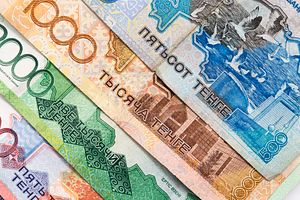One month ago, between steep swings and massive drop-offs, Bloomberg named Kazakhstan’s tenge as the most volatile currency in the world. The currency had seemingly leveled since, stabilizing under intervention. But such stability, only a few weeks later, appears an aberration. This week, Bloomberg reassessed the tenge and found the currency the “worst performer … globally.”
The new title comes on the back of a pair of developments. Firstly, Kazakhstani President Nursultan Nazarbayev named Daniyar Akishev as the new head of the country’s central bank. Akishev took over from Kairat Kelimbetov, the latter effectively scapegoated for the currency’s rampant ills – all the more after Nazarbayev’s re-election campaign earlier this year pledged no sudden devaluations. Akishev, however, was promptly greeted with the second reality buttressing Bloomberg’s assessment: On Thursday, the tenge reached an all-time low, scraping 301 tenge per dollar. (Only 19 months ago, the tenge appeared steady at approximately 140 per dollar.)
The central bank noted that the latest drop – which isn’t nearly as precipitous as prior sags, thankfully – doesn’t necessarily threaten the country’s financial stability. Nonetheless, Akishev will now see himself steering the world’s worst-performing currency, as well as attempting to cope with the “record exodus from tenge savings in banks,” as Bloomberg noted. And as Financial Times added, after assessing the crunch following the commodities drop, “Nowhere is the pain intensifying more quickly than … Kazakhstan.”
Fortunately, not all financial news for Astana is as bleak. Earlier this week, Nazarbayev flew to London to seal some $5 billion worth of trade and investment deals with the United Kingdom. As Eurasianet’s Joanna Lillis detailed, “One coup for Nazarbayev was an agreement for a British company to invest some $3.1 billion in a project to bring gas from the energy-rich west of his vast country to the capital Astana and the industrial heartlands.” The deals include gas infrastructure and transit investments, a boon to Kazakhstan’s flagging hydrocarbon industry. The Diplomat’s Catherine Putz notes that Nazarbayev also picked up uranium deals with a quick swing through France.
The ties between London and Kazakhstan remain firm – and, to numerous observers, disconcerting. Not only has former British Prime Minister Tony Blair acted as an adviser for Nazarbayev for years, seeing his company rake in attendant millions annually, but current PM David Cameron himself flew to Kazakhstan two years ago. Nazarbayev’s visit saw relatively significant pushback from non-governmental organizations, highlighted by a letter from the secretary of Campaign Kazakhstan:
Tony Blair, who has been paid millions by Nazarbayev for “consultancy”, should be ashamed that lawyers like Vadim Kuramasov, who have defended Nazarbayev’s opponents in the courts, continue to be arrested and jailed on trumped-up charges. Aron Atabek, a renowned poet, remains in prison after protesting at the destruction of workers’ homes. Workers trying to organize independent and free trade unions face victimization, harassment, and often worse.
As it is, London’s Foreign Office recently named Kazakhstan a country “on the verge of becoming a regional and international player.” But the country’s continued currency ills, which show little sign of slowing, make the Foreign Office’s assessment ring hollow – no matter how many gas deals are struck.

































